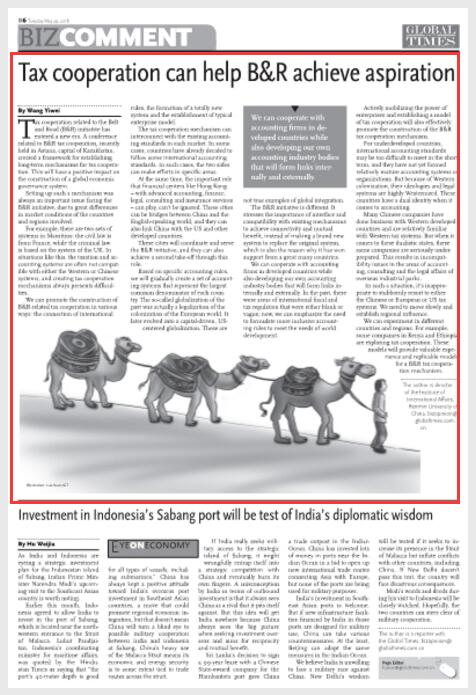Belt and Road
Your Present Location: PROGRAMS> Belt and RoadWang Yiwei: Tax cooperation can help B&R achieve aspiration
By Wang Yiwei Source: Global Times Published:2018-5-28
Tax cooperation related to the Belt and Road (B&R) initiative has entered a new era. A conference related to B&R tax cooperation, recently held in Astana, capital of Kazakhstan, created a framework for establishing long-term mechanisms for tax cooperation. This will have a positive impact on the construction of a global economic governance system.

Setting up such a mechanism was always an important issue facing the B&R initiative, due to great differences in market conditions of the countries and regions involved.
For example, there are two sets of systems in Mauritius: the civil law is from France, while the criminal law is based on the system of the UK. In situations like this, the taxation and accounting systems are often not compatible with either the Western or Chinese systems, and creating tax cooperation mechanisms always presents difficulties.
We can promote the construction of B&R-related tax cooperation in various ways: the connection of international rules, the formation of a totally new system and the establishment of typical enterprise model.
The tax cooperation mechanism can interconnect with the existing accounting standards in each market. In some cases, countries have already decided to follow some international accounting standards. In such cases, the two sides can make efforts in specific areas.
At the same time, the important role that financial centers like Hong Kong - with advanced accounting, finance, legal, consulting and insurance services - can play, can`t be ignored. These cities can be bridges between China and the English-speaking world, and they can also link China with the US and other developed countries.
These cities will coordinate and serve the B&R initiative, and they can also achieve a second take-off through this role.
Based on specific accounting rules, we will gradually create a set of accounting systems that represent the largest common denominator of each country. The so-called globalization of the past was actually a legalization of the colonization of the European world. It later evolved into a capital-driven, US-centered globalization. These are not true examples of global integration.
The B&R initiative is different. It stresses the importance of interface and compatibility with existing mechanisms to achieve connectivity and mutual benefit, instead of making a brand new system to replace the original system, which is also the reason why it has won support from a great many countries.
We can cooperate with accounting firms in developed countries while also developing our own accounting industry bodies that will form links internally and externally. In the past, there were areas of international fiscal and tax regulation that were either blank or vague; now, we can emphasize the need to formulate more inclusive accounting rules to meet the needs of world development.
Actively mobilizing the power of enterprises and establishing a model of tax cooperation will also effectively promote the construction of the B&R tax cooperation mechanism.
For underdeveloped countries, international accounting standards may be too difficult to meet in the short term, and they have not yet formed relatively mature accounting systems or organizations. But because of Western colonization, their ideologies and legal systems are highly Westernized. These countries have a dual identity when it comes to accounting.
Many Chinese companies have done business with Western developed countries and are relatively familiar with Western tax systems. But when it comes to these dualistic states, these same companies are seriously underprepared. This results in incompatibility issues in the areas of accounting, consulting and the legal affairs of overseas industrial parks.
In such a situation, it`s inappropriate to stubbornly resort to either the Chinese or European or US tax systems. We need to move slowly and establish regional influence.
We can experiment in different countries and regions. For example, some companies in Kenya and Ethiopia are exploring tax cooperation. These models will provide valuable experience and replicable models for a B&R tax cooperation mechanism.
Wang Yiwei is senior fellow of Chongyang Institute for Financial Studies, Renmin University of China.
Key Words: Belt and Road; tax; cooperation; Wang Yiwei























































































 京公网安备 11010802037854号
京公网安备 11010802037854号





